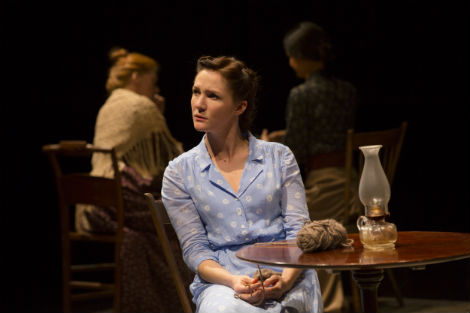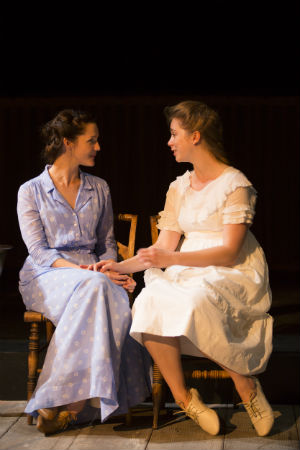
Kate Kearney-Patch, Jessica Collins, and Elisabeth Waterston It isn’t very often that the translators of a play receive the kind of star billing that Richard Pevear and Larissa Volokhonsky get for their work on the Williamstown Theatre Festival production of Ivan Turgenev’s 1850 play, A Month in the Country, running now through August 19. But Pevear and Volokhonsky are no ordinary translators; they are living, modern-day rosetta stones who manage to convey, in a timeless, contemporaneous way, the genius of authors such as Leo Tolstoy and Fyodor Dostoevsky into English. (The experience of reading their recent, unexpurgated translation of War and Peace made crystal clear the omniscient genius of its author; it was one of those transformational experiences one has with such books, but on the grandest scale of all.) Now, for the first time, they’ve turned to drama, with noted non-Russian-speaking playwright Richard Nelson, who also serves as director here, and their first choice is the famous if not always successfully produced work by the Russian author. After seeing it, all I can say is go ahead and put all of their names in neon (costly though that might be).

In his fiction as well as in this, his most well-known play, Turgenev displayed the realistic insight of Chekhov but with a delicacy about the vagaries of human emotion that verges on the Mozartian, a down-to-earth playfulness perhaps even more difficult to translate in an English-speaking production. The language here is as plain and simple as can be, even if the emotions get complicated. Past productions (using perhaps more florid translations) have also felt the need to cast luminescent, charismatic, soulful (and more elderly) actresses in the leading role of Natalya: the likes of Helen Mirren, Uta Hagen, and Rosemary Harris. I serendipitously came upon a reference to a 1930 Theatre Guild production of the play starring Alla Nazimova, the legendarily mystical silent-film and theater actress. (No, I was not around to see it, thank you very much.) Casting these magnificent women seems a no-brainer, and certainly good insurance against the plays’ foreign, undertoned, superficially antiquated nature. But this time around, director Nelson has bravely opted for someone more life size, if not downright jejune: Jessica Collins, a delicate-featured modern American actress whose rather quiet, uninflected approach to the role, at least in the first act, seems not quite communicative enough for whatever is irking her.

This approach, however, starts to pay off magically in the second act when Collins’ performance transforms into a convincing evocation of comically confused feelings — the kind expressed by intelligent, sensitive, but not particularly remarkable young people trying to sound adult, perhaps as Turgenev truly meant it to be. The whole show then spins onto the edge of exquisite farce about the mercurial nature of human (in this case, female) emotion. Also absolutely terrific, in supporting but pivotal roles: Sean Cullen as Ignaty Shpigelky, a nosey doctor; Elisabeth Waterston (above center right) as housemaid Lizaveta (whose face speaks volumes when she’s being courted by the former) and well, pretty much the rest of the cast, all of whom truly flower in the second act. Most stunning of all is Charlotte Bydwell, as Natalya’s 17-year-old ward, Vera (on the right with Collins), who at one point seems to single-handedly lift the play a few feet off of the ground. Williamstown’s version of A Month in the Country is a wise, unstressed, genuinely organic production of a very special play that must be experienced. —Scott BaldingerA Month in the Country at Willliamstown Theatre Festival By Ivan Turgenev Translated by Richard Pevear, Larissa Volokhonsky and Richard Nelson Directed by Richard Nelson Starring Jessica Collins, Sean Cullen, and Charlotte Bydwell








